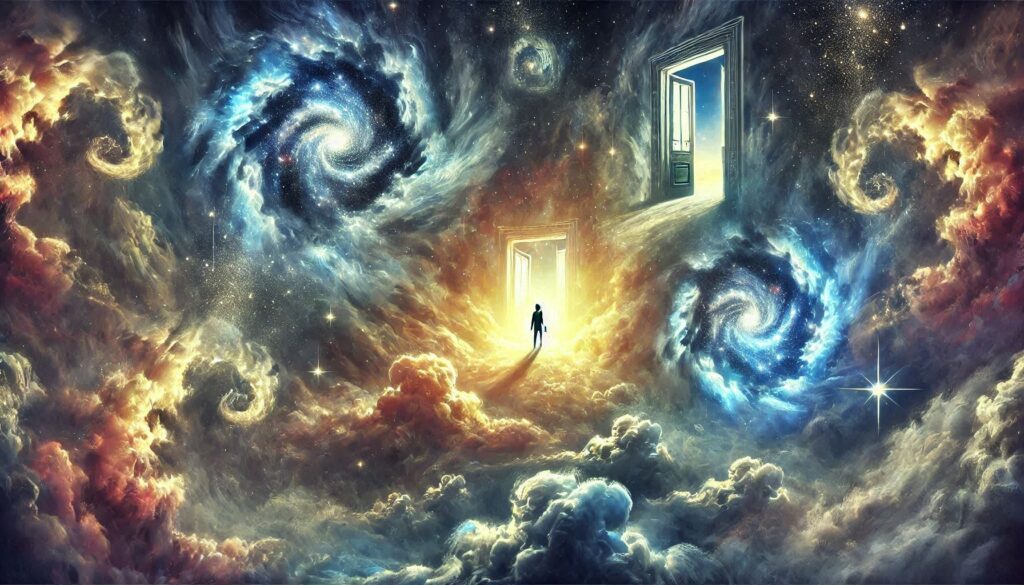
The Prelude: A World Beyond Waking
“What if the time we spend asleep is more meaningful than we think?”
For centuries, sleep has been regarded as a biological necessity, a time for rest and rejuvenation. Yet, beneath the surface of this nightly ritual lies a world brimming with mystery and untapped possibilities. What if our sleeping hours hold the key to understanding realms of existence that our waking minds can barely comprehend?
Ancient cultures believed sleep was more than just a physiological phenomenon; they saw it as a divine encounter or a journey into the supernatural. The Greeks revered Hypnos, the god of sleep, as a portal to dreams that foretold the future. Indigenous communities across the globe often viewed dreams as messages from ancestors or guides from another dimension.
Modern science has mapped brainwaves and identified REM cycles, but much about sleep still evades understanding. Could there be truths hidden in the pseudoscience of dream interpretation, lucid dreaming, or astral projection? This blog will explore the mysterious edges of sleep, where myth and science meet, and where the ordinary transforms into the extraordinary.
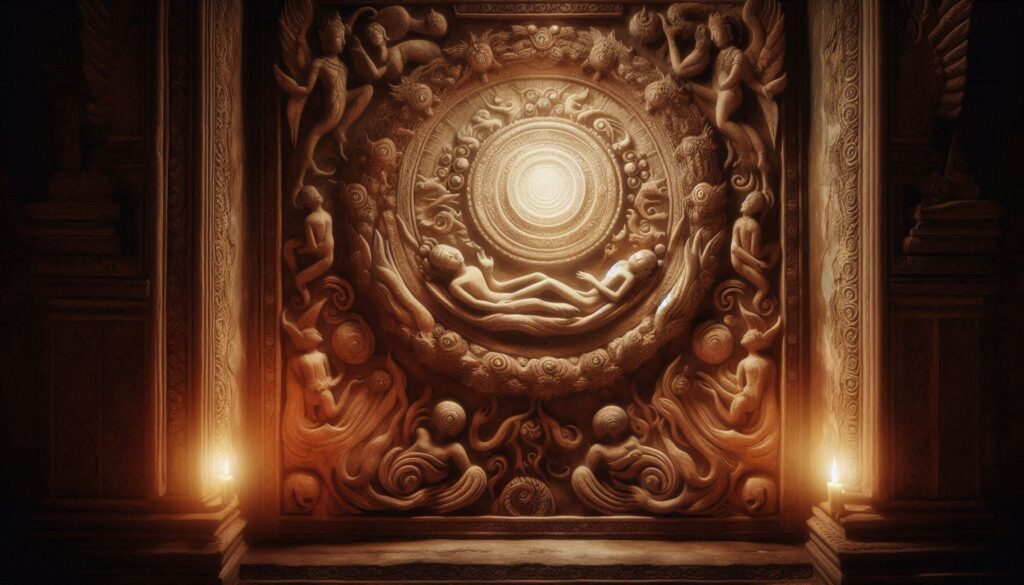
The Myths of Sleep: Ancient Beliefs and Modern Interpretations
Sleep has always been more than mere rest. Across cultures and centuries, it has inspired myths, beliefs, and pseudoscientific ideas that intertwine the spiritual and the mysterious. To the ancients, sleep was a sacred bridge between the earthly and the divine—a time when mortals communed with gods or glimpsed realms beyond the physical world.
Ancient Sleep Myths: Dreams as Divine Messages
In ancient Egypt, dreams were seen as sacred messages from the gods, delivered to guide or warn the dreamer. Pharaohs often employed dream interpreters, believing that the symbolic images seen during sleep carried divine instructions. Papyrus scrolls reveal elaborate dream manuals, suggesting interpretations for everything from seeing a snake (a harbinger of prosperity) to dreaming of drinking wine (a sign of upcoming sorrow).
Meanwhile, the Greeks viewed sleep as a liminal state where the soul temporarily left the body to wander. This belief explained why dreams felt so vivid and real—because the soul was experiencing them firsthand in another plane of existence. Hypnos, the Greek god of sleep, was said to live in a dark, tranquil cave surrounded by poppies, symbolic of the deep and transformative nature of sleep.
Even the Romans, who admired logic and discipline, honored Somnus, the god of slumber, and revered dreams as potential omens or divine counsel.
Modern Pseudoscience: Sleep as a Gateway
Though modern science has demystified much of sleep’s biological mechanics, pseudoscience keeps the intrigue alive by weaving myths into new frameworks.
One popular notion suggests that different stages of sleep correspond to different dimensions of consciousness. During light sleep, some theorize, our minds access a “thought plane,” where fragmented ideas and memories surface. In deep sleep, we supposedly connect to a “universal subconscious,” allowing us to gather insights or solve problems we couldn’t in waking life.
Lucid dreaming—where one becomes aware they are dreaming—adds fuel to the idea that sleep grants access to alternate realities. Some enthusiasts even suggest that mastering lucid dreaming could unlock hidden psychic abilities, allowing dreamers to predict events, communicate telepathically, or explore parallel dimensions.
Sleep Paralysis: A Door to the Unknown?
Perhaps the most chilling pseudoscientific claim about sleep is tied to sleep paralysis—a state where the body is immobilized during the transition between waking and sleep. Science explains this as the brain’s protective mechanism to prevent movement during dreams. However, folklore and pseudoscience often see it as something far more sinister.
From the ancient “Old Hag” legend to modern tales of alien abductions, sleep paralysis has been linked to encounters with otherworldly entities. Some believe this paralysis is not a malfunction but a momentary opening of a door to hidden realms. During these fleeting moments, they claim, we are vulnerable to energies or beings from beyond.
The Psychic Sleep Connection
Less-researched claims also suggest that sleep might enhance latent psychic abilities. Advocates of this idea argue that in deep sleep, when the conscious mind is silenced, the subconscious can act as a receiver for intuitive or extrasensory information. Anecdotal evidence abounds: people who dream of a loved one only to wake and find they’ve passed away, or precognitive dreams warning of dangers ahead.
Whether rooted in ancient myth or modern speculation, these ideas remind us of how little we truly understand about the landscapes we traverse during sleep. Could there be truths hidden in these claims, waiting to be uncovered? Perhaps sleep is not just a biological function but a nightly journey into the unknown.
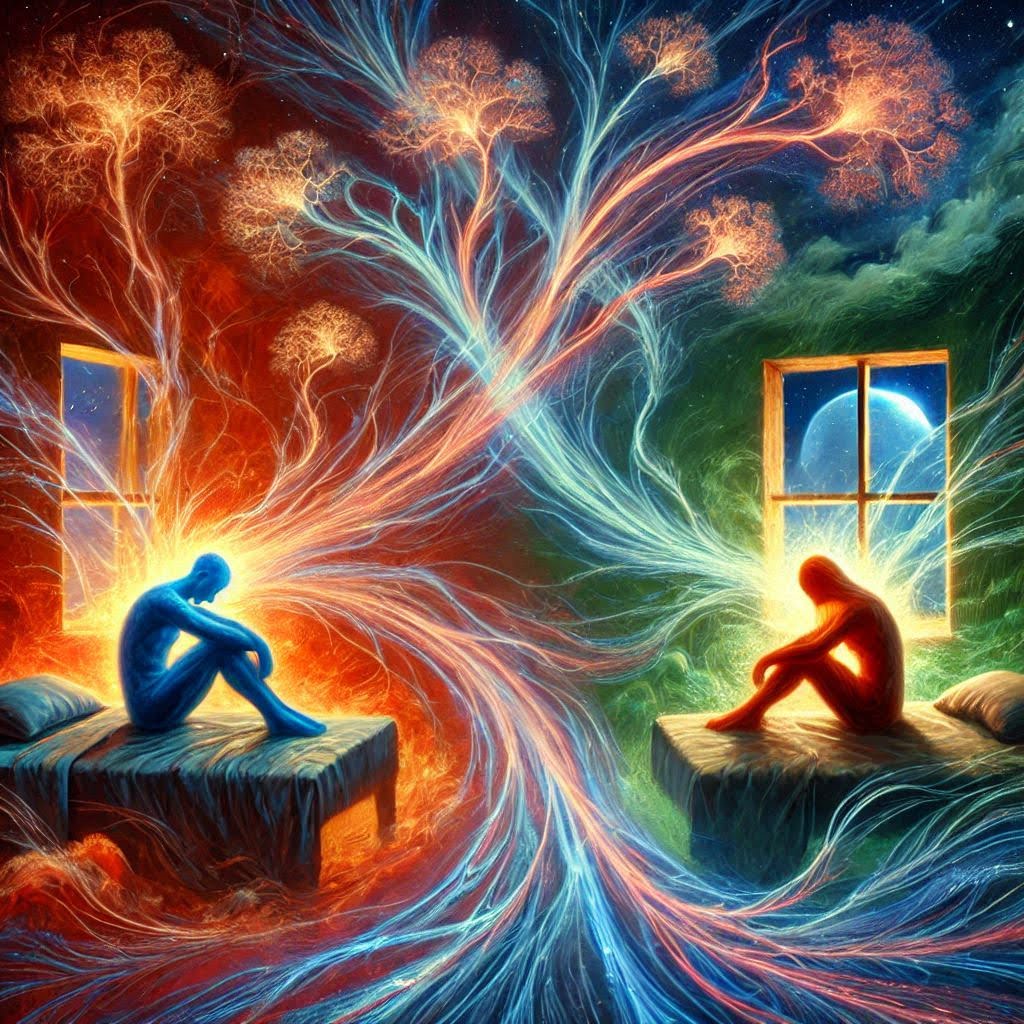
The Science of the Unreal: Fascinating Pseudoscientific Claims About Sleep
While science has made remarkable strides in understanding sleep’s biological processes, it has done little to dim humanity’s fascination with the mysteries of the night. In the vast, dimly lit corridors of pseudoscience, imaginative theories abound, bridging sleep with quantum physics, reincarnation, and cosmic energy. Though unproven, these ideas offer a thought-provoking lens through which to view our nightly journeys.
Quantum Dreaming: Tapping into Parallel Universes
One of the most tantalizing pseudoscientific claims about sleep is the concept of Quantum Dreaming. This theory posits that during REM sleep—the stage associated with vivid dreams—our consciousness momentarily transcends dimensions, accessing alternate realities or parallel universes. Proponents of this idea draw upon quantum mechanics, suggesting that the mind, much like subatomic particles, can exist in a state of superposition.
Could that surreal dream where you lived a completely different life actually be a glimpse into an alternate version of yourself? While mainstream science attributes such dreams to the brain’s imaginative synthesis of memories and emotions, quantum dreamers argue that these experiences may reveal fragments of a multiverse, only accessible when the brain is unshackled from its waking-state limitations.
Sleep and the Cycle of Reincarnation
Another pseudoscientific claim dives into the esoteric realm of reincarnation. According to this theory, sleep serves as a bridge not just within a single lifetime but across multiple incarnations. Some suggest that dreams act as a medium for transferring memories, knowledge, or unresolved emotions from past lives to the present.
These ideas are often intertwined with reports of children or adults experiencing vivid, recurrent dreams of places, events, or people they’ve never encountered. Could these dreams be echoes of a soul’s journey through time? While no concrete evidence supports this idea, it aligns with many spiritual traditions that regard sleep as a time of communion with the eternal and the infinite.
Sleep Postures and Cosmic Alignment
The position in which you sleep could influence more than just your comfort, according to some pseudoscientific theories. Advocates of “cosmic sleep alignment” claim that certain sleep postures can enhance energy flow and synchronize the body with universal vibrations. For example:
- Sleeping on your back is said to promote connection with higher dimensions, as it allows the body to align naturally with the Earth’s electromagnetic field.
- Sleeping on your left side, meanwhile, is believed to stimulate the flow of prana (life force) through the body, enhancing spiritual receptivity.
Though these ideas lack empirical support, they echo principles found in yoga, traditional Chinese medicine, and Ayurveda, where the alignment of body and energy fields plays a significant role.
Lunar Influence on Lucid Dreaming
Since ancient times, the moon has been associated with human behavior, from influencing tides to purportedly triggering erratic behavior in humans. A pseudoscientific extension of this idea suggests that the moon’s phases can impact the clarity and intensity of dreams.
According to this theory, sleeping under a full moon enhances one’s ability to experience lucid dreams—the state in which dreamers are aware they are dreaming and can control their dreams. The reasoning? The full moon is believed to amplify biofield energy, a subtle energy field theorized to surround and permeate the body. Skeptics dismiss this as superstition, but anecdotal evidence of heightened dream activity during full moons remains widespread.
Biofield Energy and Dream Clarity
The notion of a biofield—a field of energy said to surround the human body—is central to many pseudoscientific beliefs about sleep. Practitioners of energy healing often claim that this biofield interacts with our dreams, influencing their clarity, vividness, and emotional tone. Some suggest that sleeping near crystals or other energy-enhancing objects can “tune” this field, leading to more profound dream experiences.
One popular practice involves placing a piece of amethyst under your pillow, believed to sharpen intuition and improve dream recall. While skeptics argue that the effects are purely psychological, those who swear by this method describe vivid, meaningful dreams that linger long after waking.
Grounding Mysticism in “Known” Science
To keep these ideas grounded, consider how some align—loosely—with known scientific facts. For instance:
- Dreams are influenced by external stimuli, such as temperature or light. Could cosmic forces, like lunar phases, exert a subtle influence as well?
- Sleep paralysis has a biological explanation, but its eerie experiences lend credence to the idea of hidden realms.
- The biofield concept mirrors the scientifically observed electromagnetic fields generated by neural activity, suggesting an imaginative but not entirely disconnected interpretation.
The Fascination of the Unknown
Though these pseudoscientific claims are far from proven, they offer a sense of wonder often missing from the clinical language of modern science. They challenge us to imagine sleep as more than a time for rest—a nightly ritual that may connect us to dimensions unseen, energies unfelt, and mysteries unexplored. What if, for all its grounding in biology, sleep is our most mystical and otherworldly experience? Whether you believe in these theories or not, they make the act of closing your eyes each night feel like stepping into an uncharted realm where anything is possible.
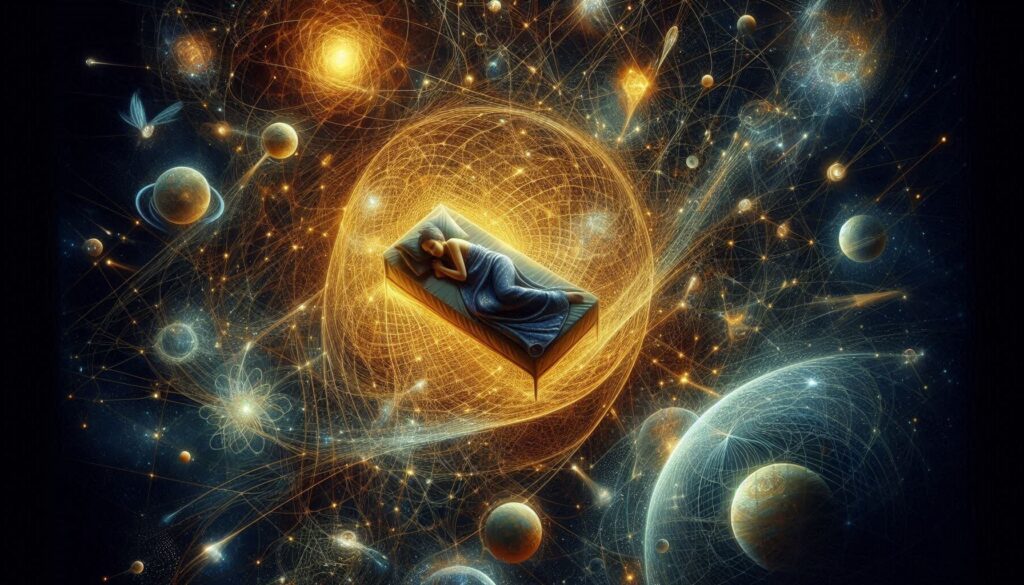
Dreams and the Human Subconscious
Dreams remain one of the most enigmatic aspects of human experience. While science has mapped the biological processes behind sleep, the mysteries of the dream world often defy explanation. From shared dreams to vivid hypnagogic images, these phenomena challenge our understanding of the subconscious and fuel speculation about deeper, unseen forces at play.
Shared Dreams: The Mystery of Dream Telepathy
The idea of shared dreams—where two or more people report experiencing the same or strikingly similar dream—is both fascinating and baffling. Friends recount dreaming of the same conversation, or family members awaken with identical dream narratives. Could this phenomenon suggest a form of telepathy?
While skeptics attribute shared dreams to coincidence or misremembering, some researchers have explored whether the subconscious mind might connect with others during sleep. Proponents of dream telepathy argue that shared dreams could reflect a deeper, collective consciousness or subtle energy fields that allow communication between minds during slumber.
Predictive Dreams: Seeing the Future?
Anecdotes of predictive dreams abound. From Abraham Lincoln dreaming of his death to countless personal stories of people dreaming about disasters, accidents, or triumphs before they occur, the notion of foresight in dreams captivates the imagination.
Science often explains these incidents as the brain’s ability to process information and anticipate future events, but this doesn’t account for the eerie specificity in some accounts. Could dreams offer glimpses into potential futures, as though peering through a window to the unknown? Some theorists propose that predictive dreams are the result of subconscious pattern recognition, while others suggest they might hint at connections to alternate timelines or universal knowledge.
Hypnagogic Images: The Gateway to the Dream World
The hypnagogic state—the threshold between wakefulness and sleep—is often accompanied by vivid and surreal visuals. These fleeting images can be fragmented, colorful, or startlingly coherent, as though the conscious and subconscious are blending for a brief moment.
Mystics have long considered hypnagogic imagery as a portal to higher consciousness or spiritual realms. Some suggest these visions represent more than random neuronal activity—perhaps they are glimpses into collective consciousness or even parallel dimensions.
Dreams: Subconscious Messages or Universal Signals?
Are dreams a reflection of our deepest thoughts and fears, or are they universal signals connecting us to something greater? Some believe they are subconscious messages, shaped by memories and emotions. Others speculate that dreams are part of a grander design—signals from a collective consciousness, cosmic energy, or even time itself.
Though science continues to study the mechanics of dreaming, the mysteries persist, keeping alive the possibility that when we dream, we are touching the edges of an extraordinary reality still beyond our understanding.
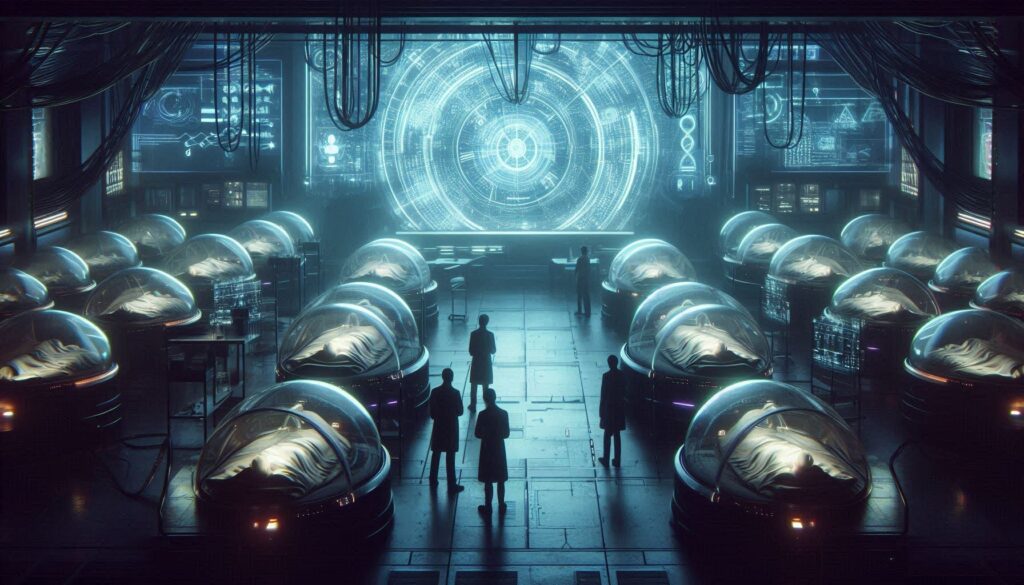
The Sleep Experiments: What’s Real, What’s Fiction?
Throughout history, sleep has been the subject of countless experiments, some of which teeter on the edge of reality and fiction. One of the most famous and chilling stories is the Russian Sleep Experiment, a fictional account that has captured the imagination of many. According to the story, Soviet researchers allegedly conducted a brutal experiment on prisoners, keeping them awake for extended periods, which led to madness, mutilation, and death. Though entirely fabricated, it plays on our deepest fears of the unknown and the limits of human endurance.
But while such stories are fictional, real-world sleep studies have also sparked intrigue and speculation. For example, sleep deprivation experiments have shown how the human brain begins to deteriorate after just a few days of no rest, offering a glimpse into the fragility of consciousness.
So, what if we could push the boundaries of sleep in ways we’ve never imagined? Could we extend human lifespans through induced hibernation? Some scientists believe that by entering a state of deep, prolonged sleep, the body could repair and regenerate, slowing the aging process. If hibernation techniques were developed for humans, could we preserve life in a way that challenges the natural flow of time?
Another “what if”: Is there a perfect sound frequency that could induce a dream state with clarity and intention? While binaural beats and sound therapy are already used to enhance sleep, could a specific frequency unlock vivid, meaningful dreams or even lucid dreaming on command?
These speculative ideas challenge the boundaries between science and pseudoscience, prompting us to ask: How far can we push the limits of our understanding, and where do the lines between reality and fiction truly lie in the realm of sleep?

Conclusion: The Boundary Between Sleep and Reality
Whether pseudoscience or undiscovered truth, sleep remains one of humanity’s greatest mysteries. It’s a realm where the boundaries of consciousness blur, where reality intertwines with the surreal, and where ancient beliefs and modern science converge in unexplained phenomena. As we continue to explore sleep, we may one day uncover secrets that challenge everything we know about the mind, the universe, and even time itself.
But for now, sleep is a paradox—a place where we dream of possibilities beyond our understanding. Perhaps the true wonder of sleep lies in the questions it raises rather than the answers we seek.
What are your own theories about sleep? Have you experienced strange dreams or encountered mysterious phenomena while you slept? Share your thoughts and stories, and let’s continue to explore the fascinating world of dreams together.
